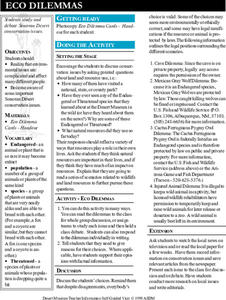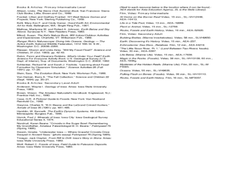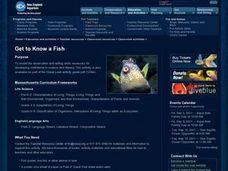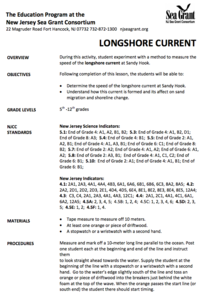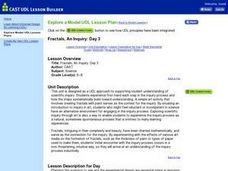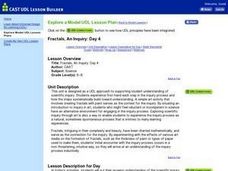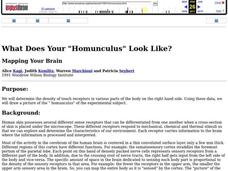Curated OER
Our Friends the Trees
Students build an animal habitat. In this animal habitats lesson, students create dead-wood habitats and observe the habitat over a period of weeks.
Curated OER
Dinosaurs 1: Where Are the Dinosaurs?
Students explore the time of the dinosaurs. In this extinction lesson, students watch a video clip about different dinosaurs and are asked about what they observed. Students talk about how dinosaurs hatched from eggs and compare that...
Curated OER
Optimal Foraging
Students participate in a foraging activity that demonstrates environmental conditions playing an important role in determining the optimal foraging behavior of a particular organism.
Curated OER
Sonoran Desert
Learners discuss the complicated environmental issues that face different people today. They establish legal positions surrounding several different scenarios.
Curated OER
The Farmer Cares for the Land
Students explore farming by creating visual demonstrations. In this agriculture lesson, students read assigned text about a farmer's duty and identify the events that have taken place in the history of agriculture. Students collaborate...
Curated OER
Crinoids: Flowers f the Iowa Seas
Students study the rocks and fossils associated with the geologic landscape of Iowa. In this rocks and fossils activity, students examine fossils that would be found in the Iowa landscape that show evidence of marine invertebrates such...
Curated OER
Bird Bodies
Students read about and explore the different types of birds. They discuss how all birds are alike and what makes some different from the others. They experiment picking up "food items" using different tools that represent different...
Curated OER
Bats and Boas Abound
Learners investigate Puerto Rican boa constrictors and bats. In this animal science lesson, students read an article about the bats and snakes found in Puerto Rico. Learners use various art supplies to create a diorama of the habitat of...
Curated OER
Start at the Very Beginning
Students explore ocean ecosystems. In this cross curriculum art and oceans lesson, students create a collage featuring three-finger algae using sand paper, tissue paper, and construction paper.
Curated OER
Three R's to Environmental Stewardship: Earth Day
Students explore the ways to conserve our natural resources. In this recycling, reusing, and reducing lesson students read Dinosaurs to the Rescue and apply their findings to learning ways to conserve resources. Students complete a...
Curated OER
Get to Know a Fish
Learners discover the anatomy of a fish by identifying its body parts. In this oceanography lesson, students view a live fish in their classroom and draw a poster of the fish one body part at a time while identifying it....
Curated OER
Vertebrates
Learners identify and describe five main groups of the Phylum Chordata. They discover that the Phylum Chordata is the vertebrates. Students identify the main difference between invertebrates and vertebrates. They read passages about...
Curated OER
Longshore Current
Learners are posted at the beginning and end of a 10-meter long line parallel to the ocean and are instructed to look straight ahead towards the water. The student at the beginning of the line uses a stopwatch, goes to the water's edge...
Curated OER
Ecology 7 Midterm and Intro to Biomes
Young scholars are able to demonstrate acquired knowledge in energy and biogeochemical cycles through a midterm test. They complete their test after finishing they each choose a biome and point of the key features of it which include:...
Curated OER
Marine Protected Areas (MPA)
Ninth graders explain the purpose of MPA's. In this biology lesson, 9th graders identify MPA's in Southern California. They simulate coastal sampling using candy from two buckets. Students analyze their results and share it with the class.
Curated OER
Fractals, An Inquiry: Day 3
Students develop questions for their inquiries and plan their experiments. They are supported by a modeled case study of Max the Dog's Inquiry Planning Process, as well as supported by a planning template, The Inquiry Organizer.
Curated OER
Fractals, An Inquiry: Day 4
Students put their growing understanding of the scientific inquiry process to work. They use paint to implement their plans to experiment with how changing one aspect of the fractal making process influences their appearance.
Curated OER
A Bug's Life: Diary of an Insect's Metamorphosis
Fifth graders examine the stages of insect's to understand heredity. In this inherited traits lesson, 5th graders explore the life of the honeybee for its inherited traits. Students recognize the difference between inherited traits...
Curated OER
Teacher's Plant Collection Guide
Students explore a variety of guidelines that involve collecting plants in a responsible manner and participate in a plant pressing activity. In this teacher's plant collection guide lesson, students collect data regarding plants,...
Curated OER
Marine & Aquatic Habitats Activities - Terrestrial Forests vs. Kelp Forests
Students discuss concept and specificity of habitats, both marine and terrestrial, list similarities and differences in the habitats of a kelp forest and a terrestrial forest, compare types of organisms that occupy corresponding types of...
Curated OER
Camouflage and Protective Coloration: A Model of Natural Selection
Students study protective coloration and camouflage in animals. They create examples of each and conduct simulation-type experiments to determine which is the most effective adaptation.
Curated OER
What Does Your "Homunculus" Look Like?
Young scholars investigate the density of touch receptors in various parts of the body. They discover how the body senses various stimuli, then maps a picture of the "homunculus" of the experimental subject.
Curated OER
Enduring Understanding
Fourth graders explore indigenous people of rainforest and examine their customs and ways of life. They discuss how rainforests should be protected not only for their plants and animals, but also for indigenous people who live in them,...
Curated OER
A Fish Tale
Learners investigate the lives of fish. In this biology lesson plan, students demonstrate how fish cells respond to fresh and salty water, determine the age of a fish and if temperature effects the movement of a fish's operculum (gill...



